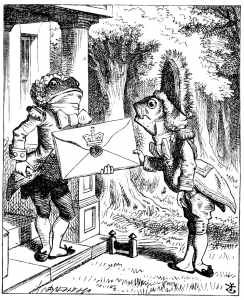The Power of Indirect Effort: A Whackadoodle lesson explaining how so much of our influence and power comes to us indirectly when we learn to put life into context. If you have entered this story in the middle, click here for the table of contents.
__________
My student sent me an email three days before before our scheduled session asking if she could be the one to lead our discussion on the Power of Indirect Effort. Since it meant that I would have less to prepare, I was happy to email back, “Sure:-).” Besides, I was kind of curious to see how she would tackle the task.
She was ten minutes early on the day of our lesson, and immediately called me to order. “Now as I see it,” she began. “The Rule of Least Effort has two parts. The first part you talk about in your first book Navigating Life. It’s where you explain that when you change how you perceive the world, you change the world indirectly. You also quote two famous guys.” She pulled out some index cards and began reading to me.
‘When we take people,’ thou wouldst say, ‘merely as they are, we make them worse; when we treat them as if they were what they should be, we improve them as far as they can be improved.’
Johann Wolfgang Von Goethe, Wilhelm Meister’s Apprenticeship, 1795.
“And the other one was,” she continued.
“If you treat people to a vision of themselves, if you apparently overrate them, you make them become what they are capable of becoming. You know, if we take people as they are, we make them worse. If we take them as they should be, we help them become what they can be.
Attributed to Viktor E. Frankl, by John Maxwell in Developing the Leader Within You
1993.
She looked up expectantly, as if to say, ‘See how well I cited that? I nodded my appreciation, and she continued shyly, “I also found this other quote by Viktor Frankl. I think it’s appropriate and would like to add it.”
“By all means,” I told her. She looked down at her cards, and continued reading.
“When we are no longer able to change a situation, we are challenged to change ourselves.”
Viktor E. Frankl, Man’s Search for Meaning, 1945
“Nice,” I admitted. “Did you actually go out and read his book?”
“No, I just found this Goodreads website with a lot of his quotes,” she confessed. “But do I think that I would like to read at least one of them. His thoughts are really deep, and he lived through so much. Anyway,” she continued, while stashing the cards away. “You essentially say in rule fourteen that we can’t change others, we can only change ourselves; however, the moment we change ourselves, our relationships and circumstances change indirectly.”
“Sounds about right,” I acknowledged.
“Okay,” she took a deep breath. “So that brings us to part two, and how you explain rule fourteen in your second book, Turbulent Tides. In that book, you give us a technique for accomplishing part one of the rule; a tool for examining, even changing, perceptions and relationships. It all has to do with placing people and situations into context. When we put everything into context, we tend to indirectly change our feelings and actions regarding our circumstances.”
“So far you are batting a thousand,” I told her, biting my tongue to keep from asking her to give an example. She had after all asked to take charge of the lesson.
“Well here’s the thing,” she said intently. “All week, I have been practicing the technique, and it actually, really works.”
“You sound surprised,” I half laughed.
“Well, I am sort of surprised,” she confided. “I mean at first, I didn’t have much luck. I’d think of situations or people that I didn’t like or understand, and I’d just get more worked up about them. But then I went back to your rules. I started with rule one, cause and effect, and I remembered that people don’t just show up the way they are, something caused them to behave as they do. Then I thought about rule two, beliefs, and I noticed how what people are taught, or not taught, throughout their lives really influences how they behave. I started to ask myself, ‘What kind of world did they grow up in to make them believe what they do? Why do they believe that men have to be strong and in control? Why do they forgive a man for grabbing a woman, while asking women to stay loyal and accepting. Who taught them that success equals power and money; that sacrifice and compromise shows weakness? I started to imaging living their world, and I swear that I started to feel, well not quite sympathy. It was more like,” she paused looking for the right word.
“Empathy?” I provided softly.
She looked up quizzically, “Is that what it feels like to feel empathy?”
“You tell me,” I shrugged. “Empathy is the ability to understand and share the feelings of another, without necessarily agreeing with them, or even liking them. Is that how you started to feel?”
“I suppose it was,” she said quietly, then rumbled on. “That’s when I turned to rule three, reflection, and saw how their words and actions reflect their beliefs systems and world view. And what I saw there seemed somehow sad. I think that I even started to feel sorry for them. Then I turned to rule four, focus, and I started to see how when I focused on what I hated about them, I lost the ability to understand the why of things. If I don’t understand the why, I can’t influence the cause. It was about then that I came to strategy, and vacuum, and process; all tools to help build a plan. That was quickly followed by responsibility; a reminder that my plans need to focus on what I control and influence. That’s it’s a waste of time to complain about others when you have no influence over them. I even started to think about ways to increase my influence.”
“Were you developing plans?” I couldn’t help but ask.
“I was starting to,” she admitted. “But I haven’t gotten very far with them yet. I still need to incorporate the last of the rules, attraction, contribution, entropy. It’s a lot to do.”
“What about understanding, persuasion, and indirect effort?” I asked.
“Oh, I’ll incorporate them too. I am listening differently, and understanding the nature of my influence more. As far as indirect effort, and putting things into context, I actually started to see your rules in a new context. How they all work together and reinforce each other. That’s when I emailed you about today,” she smiled shyly. “I wanted you to see that I get it. That all of our lessons haven’t fallen on deaf ears.”
I’m not sure, but I think one or two tears stung my eyes. I do know that I was rendered a bit speechless, which I will note is a rarity for me. I once tried to give someone the silent treatment. It lasted all of two minutes, and even those two minutes felt weird. Not knowing what else to do, I simply reached my hand across the table towards her.
She looked down at my hand and smiled, then back into my eyes. “So what do we tackle next?”
*********
Navigating a Whackadoodle World: An Epilogue
Some advice from 200 years ago
********
If you would like to have me email you our next episode once it’s gets posted, please join our mailing list.
_________
If you you enjoyed this post, please leave a comment below. It helps our algorithm.
It would also be great if you shared this post. It also helps our algorithm.
If you would like to join Lynn’s mailing list, or ask a Dear Navigator question click here

You can reach Lynn Marie Sager at
DearNavigator@gmail.com
Author:
- Navigating Life in a Whackadoodle World
- Finding Sense in a Whackadoodle World
- Teaching Logic in a Whackadoodle World
- Navigating Life Through Turbulent Tides
- A River Worth Riding: Fourteen Rules for Navigating Life

